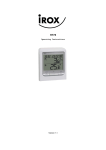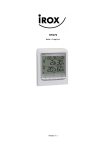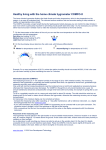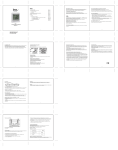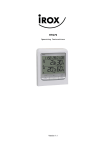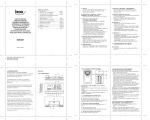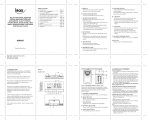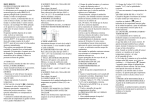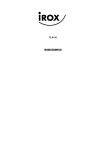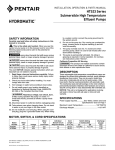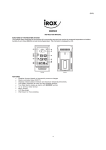Download JKTG-4R Product Manual
Transcript
KSPO:0399-09 IROX OST14-MANUAL(Eng) SIZE:W100 x H100(mm) BY Lai HZ 20/7/09 Table of contents 1. Introduction 2. Operating elements 2.1 LCD display 2.2 Keys / Switch / Battery compartment 3. Putting into operation 4. Radio thermometer 5. Operation 5.1 Thermo/hygrometer 5.1.1 Reading of the temperature from each channel 5.1.2 MIN/MAX memory 5.1.3 Comfort zone 6. Change of battery 7. Care instructions 8. Support 9. Technical data (display unit) JKTG-4R Operating Instructions Page 29 Page 30 Page 30 Page 31 Page 33 Page 34 Page 36 Page 36 Page 36 Page 37 Page 37 Page 38 Page 38 Page 39 Page 39 Version 1.1 1 28 2. OPERATING ELEMENTS 1. INTRODUCTION Instruments by Jörg Kachelmann 2.1 LCD DISPLAY All functions are depicted on the liquid crystal display (LCD) in 3 windows. Jörg Kachelmann, meteorologist and founder of Meteomedia AG, revolutionised weather reports in the early 90ies with a new type of media presentation and the high quality of his local weather forecasts. Today Meteomedia is one of the leading weather services in Europe and, with its own Severe Weather Centres in Switzerland and in Germany, among other things, specialist for modern early warning systems for extreme weather conditions. The core of the company is the private weather measurement network. It is one of the biggest measurement networks in Europe. With "Instruments by Jörg Kachelmann" Irox, market leader in the manufacturing of measuring devices, and Jörg Kachelmann have developed a joint product that convinces with its high quality measurements, simple handling and elegant design. Weather forecasts by Jörg Kachelmann: www .meteocentrale.ch The JKTG-4R is a high-quality thermo/hygrometer that gives you the absolutely unique feature of choosing between three different max/min memory functions. The recording is done independently for each of the 6 channels in total. The individual scanning of the 5 radio sensors also makes operation transparent and calculable. Please read the instructions carefully. They contain some useful and interesting information that go beyond a mere explanation of how to operate the device. Full-segment display Radio channels 1-5: - current measurement of the selected channel (=radio probe) - memory values min/max of the selected channel - battery status of the sender displayed Comfort Zone: - display of the comfort status of the measurement of the indoor thermo/hygrometer Indoor thermo/hygro : - temperature and relative air humidity of the display device (measures at the location where the device is used) - memory values min/max of the indoor thermo/hygrometer - battery status of the display device 29 30 T/H SET 2.2 KEYS / SWITCH / BATTERY COMPARTMENT - For the IN measurement, the MIN/MAX values of the temperature or the relative air humidity are displayed below the current value. With this key, you can have the temperature or hygro memory displayed. Rear view MIN-MAX The MIN/MAX memory is managed and recorded depending on the setting. The setting applies for all 6 channels Pos. 1: PERM - From the last MEMORY RESET, the MIN/MAX recordings after the function “drag indicator” are recorded. This recording is "PERMANENT", i.e. a new recording does not start until after a new MEMORY reset. Pos. 2: 24 Hr - If you choose this option, the MIN/MAX values for the last 24-28 hours in each case are recorded. After expiry of this period, the MIN/MAX values that are older than 24-28 hours are removed from the memory. As soon as you have selected this option, we recommend that you start the memory recording in a defined way with a MEMORY RESET. This then starts a recording that triggers internally an elaborate calculation and recording. The MIN/MAX values are administered here in blocks of four hours. Example: You want to be able to read the MIN/MAX values of the last 24-28 hours at all times. Irrespective of when you look at the display, you will always see the extreme values of the last 24-28 hours. Older recordings are deleted in the process. °C/°F - Changes the unit of temperature in the display from °C to °F or vice versa MEMORY RESET - Hold pressed for 3 seconds: Resets all memories (IN and CH1 ... CH5). The new recording now begins depending on the setting of the MIN-MAX switch CH (=CHANNEL) - Press briefly: changes to display of the next channel (1 2 3 4 5 1 etc) Pos. 3: DAY- If you select this option, the MIN/MAX values are recorded for 24 hours in each case. You are free to choose when the recording should begin. The start is determined by a MEMORY RESET and after 24 hours, the memory is automatically reset and a new recording begins. Example: You want to be able to read the MIN/MAX values of the last 24 hours in each case at 8 p.m. You therefore carry out a MEMORY RESET at 8 p.m. With this RESET, the clock begins to tick internally and this automatically resets the memory after 24 hours and starts a new recording. - Hold pressed for 3 seconds. For the radio channel active on the display (CH1 .... CH5), a sender search is started. The three waves above the CH flash during the search process. Only the sender of the channel displayed is searched for; the others remain unaffected. 31 32 4. RADIO THERMOMETER Battery compartment The operation of the radio sensor supplied with the device is easy: - Open battery compartment - Select channel - Activate batteries (i.e. remove insulation strip) or insert batteries (please make sure that the polarity is correct!) - Close battery compartment again (please ensure that it is tightly closed!) 2 x 1.5 batteries of the size AM-4 resp. “AAA” To open: slide lid in the direction of the arrow (indicated on the lid) after the stand has been removed. Other Irox radio sensors that are compatible with the JKTG-4R: 3 channels (can be used on the channels, 1, 2 or 3) : HTS12C, HTS33, HTS13*, HTC13 5 channels (can be used on all 5 channels): HTS55, JKR-1 3. PUTTING INTO OPERATION (*HTS13 is included in the scope of delivery of the JKTG-4R and can be used on the channels 1-3) 1. Put all radio sensors that you want to use into operation and place these in close proximity (1-2 metres) to the reception device. With the sensors with thermo and hygrometer, simply only the temperature is displayed on the JKTG-4R. 2. Open the battery compartment of the display device and remove all insulation strips. If no batteries are in the device, insert the 2 batteries (UM-3 or ‘AA’ 1.5 V) in the correct polarity. Reception status display 3. Now close the battery compartment. The wave symbol indicates the status of the signal reception of the channel displayed. 4. Directly after the activation of the batteries, all segments are displayed for a few seconds on the display. The JKTG-4R then begins with the search of available sensors on all 5 channels. 5. As soon as the sensor is displayed correctly (see ‘Reception status’ in Chap., 4), you can set up the sensor in the place where you want to effectively measure the outdoor temperature. Under the most ideal conditions, this can be up to 30 m away. In reality, however, this is often less. In the event of problems, try out other places, and do so both for the sensor and for the display device. The radio sensor is weatherproof. Nevertheless, please place the sensor where possible in the dry and at any rate in the shade. 6. If you would like to display further sensors on the reception device, you can purchase these from shops. For outdoor use, we recommend weatherproof sensors. If you would like to display other interior spaces, the sensor JKR-1 from the ‘Instruments by Jörg Kachelmann’ range is available in the same design as that of the display device and also has a large display. 33 The unit is in searching mode. Temperature readings are securely registered. No signals. 34 Start search process for a sensor Signal ‘collisions’ Select the desired radio channel with the CHANNEL key. Radio signals of other devices in their environment can cause disruptions or temporary interruptions in reception. This is not bad but could be annoying under certain circumstances. Such typical 'disruptive systems’ are radio door bells, wireless security systems, tube screens (PC/TV), control systems, etc. In such cases, it can also be helpful to use another channel. Example: Channel 4 (the number 4 is flashing) Now press and hold the SEARCH key until the wave symbol starts to flash. The device now searches for the sensor on channel no. 4. This process can take a few minutes and is finished as soon as the wave symbol stops flashing. We have deliberately ensured that the search channel can be individually called up per channel so that sensors that are already logged in are not affected by subsequent enhancements. Signal interruptions Each sensor is read by the device once a minute. If more than 8 readings are read one after the other without data, lines appear in the display for this channel and the JKTG-4R then stops any other reception attempts after this for 8 hours. The display device starts a reception again by itself after approx. 8 hours. If the original sender is not found again, the device starts with a new search for a new sensor on this channel. When the signal is interrupted, you can start a new signal search at any time manually. Please, however,check the following points beforehand: 1. whether the sensor is still in place 2. the batteries of the sensor and the display device. Please also replace them when a battery tester rates them as still being sufficient! Further info on this can be found in the FAQ on www.irox.com. Note: If the outdoor temperature drops sharply, the output of batteries that have been started is also strongly reduced. It is therefore recommended that new batteries are always inserted in the sensor at the beginning of the winter (alkaline type or better). 3. whether disturbances or shields are to be found in the area of the sender/receiver or the distance between the two devices is too great. 5. OPERATION 5.1 THERMO/HYGROMETER The JKTG-4R measures the temperature and relative air humidity directly and also receives the measurements of up to a maximum of 5 IROX radio temperature sensors. Each sensor is to be set to one of the channels 1-5 (resp.1-3 for 3-channel devices). The temperature currently measured is displayed in the information windows in °C (or °F) and, for the location of the display device, the relative air humidity in % and the Comfort Zone. The following operations can be made in this function: 5.1.1 Reading of the temperature from each channel Briefly confirm the key CH to jump from channel to channel. - The next channel is thus displayed with each press of the key and activated for further operations. The sequence of the activation is CH1 CH2 CH3 CH4 CH5 CH1 etc This is independent of whether a radio sensor is available in the system or not. Please note: The measurement is always depicted in the lower window; channels 1-5 one after the other in the upper window. The search processes described above for a ‘lost’ sensor do not have any influence on any other existing sensors that function without problems. 35 36 5.1.2 MIN/MAX memory 6. CHANGE OF BATTERY a) The MIN/MAX values are always present on the display below the current measurement value. - LEFT: Minimal (=lowest) temperature "MIN" - RIGHT: Maximum (=highest) temperature "MAX" : BATTERY CHANGE DISPLAY The batteries last for around 8-12 months. Depending on the usage of the appliance and the batteries used, this time can be slightly shorter or longer. In order to avoid a surprising and unpleasant interruption to operations, the battery symbol appears in the two temperature windows with the corresponding channel. This means that batteries of the display appliance (in the IN window) or of a radio sender (in the CHx window) are becoming too weak and need to be replaced. The logic of the recordings is displayed in Section 2.2 Operating elements. Please note: Lines appear if no data are available. This occurs when a channel is not allocated or the sensor is no longer being received. To change the batteries, please note Chapter 3 (Putting into operation). Please only use new batteries and never mix old and new batteries. 5.1.3 Comfort Zone The Comfort Zone is only displayed for the thermo/hygro measurement of the display device. With the outdoor sensors, only the temperature is received and displayed; it is thus not possible to calculate the Comfort Zone for CH1...CH5. The logic is depicted in the following illustration: Please also remember that used batteries should not be thrown in the household rubbish bin but handed in at the designated collection points. The environment will thank you for it! 7. CARE INSTRUCTIONS - Do not expose the device to extreme temperatures or direct sunlight over longer periods. - Avoid blows and shocks of any kind to the device. - For cleaning use a dry soft cloth that you have moistened with water and a mild cleaning agent. Never use volatile substances such as benzene, thinner, cleansing agents in spray cans etc. - When the device is not being used store it in a dry area and out of the reach of small children. - If the device is activated under extreme coldness it may occur that the display becomes illegible. As soon as it is returned to a warm environment the device will function normally. - Please keep the user’s manual and other documents delivered with the device stored carefully so that you can reference them at a later point if necessary. - Please use only new batteries and never mix old and new batteries. - Please also remember that old batteries should not be disposed of with household waste but should be handed in at the designated collection centres. - Important: With all Irox appliances, all disposal fees in Switzerland (vRG; advance recycling fee) and in the EU (WEEE) have been paid. 37 38


